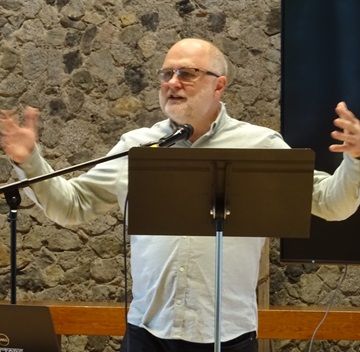
Tim Dickau, Tom Cooper and John Martens are gathering a team to engage in public theology.
Two years ago, I had a rousing two-hour conversation with the then interim principal of St. Mark’s College on the UBC campus, Michael Higgins.
He is the leading biographer of such figures as Henri Nouwen and Thomas Merton and has taught in Catholic universities across the country. If you read the Globe and Mail or other national newspapers, you may have come across some of the regular, thoughtful articles he has written on such topics as Middle Eastern conflict, the challenges faced by modern universities and Pope Francis’ apology to Indigenous peoples in Canada.
During our conversation, Michael lamented the lack of public theology here in Vancouver. Public theology is the Christian engagement and dialogue within the church but especially with the larger society. As such, a public theology engages the challenges and issues impacting our society, offering a perspective shaped by our understanding of the world created and being restored by God.
By the end of our talk, Michael was noticeably invigorated with the idea of pulling together a group of people together who could step into the public dialogue here in Metro Vancouver. However, he moved back to Ontario shortly after our talk and I was not quite ready to initiate the building of this network.
Ready to go
But now, a group of us are ready. And we are going to give it a go – though we do not yet have a name so feel free to make suggestions!
John Martens (also at St. Mark’s college, he is Director of the Centre for Christian Engagement) and Tom Cooper (long-time president of City in Focus who helps to facilitate the annual British Columbia Leadership Breakfast) and I are in the midst of pulling together a group of about 25 emerging and established leaders who are also writers from across Metro Vancouver to form a network aimed at stepping into this vacuum of public theology.
Some of the names in this group you may recognize and some you may not. They include folks like Albert Chu, Karen Reed, Ross Lockhart, Karen Giesbrecht, Diane Stinton, Ben Perrin, Susie Colby, Peter Mogan, John Hau, Jamie Hellewell and others.
We have sought to collect a group with denominational, vocational and ethnic diversity. Towards this goal, we have in our group a lawyer, pastor, non-profit leader, academic/educator, community developer, nutritionist and conservationist; from Catholic, Mennonite, Baptist, Pentecostal, Vineyard, Anglican and Presbyterian backgrounds; with Chinese, Indigenous, Latin American and other ethnic backgrounds.
We’ve had one gathering of this group to discuss some of the issues we intend to write about, and areas where we have some expertise that overlaps with key challenges facing our society.
These include topics addressing isolation by knowing your neighbours, moving beyond philanthropy towards impact investing, overcoming food insecurity, interfaith dialogue, the lingering human longing for story and living hospitably in an age of suspicion. We hope to write in a way that speaks to a wider swath of readers beyond the church and that offers intelligent, evocative, truthful and hopeful perspectives.
We are grateful that Flyn Ritchie will initially publish these articles in the Church for Vancouver newsletter. Flyn has fostered the kind of ecumenical, diverse, thoughtful approach to journalism throughout his entire career that this network seeks to emulate.
While these articles will appear in this site first, our desire is to see them published in other places such as daily or community newspapers, social media sites, magazines or church websites. These pieces will advance differing perspectives that will not even be agreed upon by everyone in the network, which means that you the readers are unlikely to agree with all of them either. But like all fruitful public theology, we hope they will spark public, hospitable and mutually edifying debate.
Interactive pluralism
One of the premises for a public theology is that, in the words of former Anglican Archbishop of Canterbury Rowan Williams, we live in a society that invites “interactive pluralism.” This is the sort of dialogue that calls us to move beyond “nervous evasive good manners” to the hard work of restructuring society together with many voices.1
Towards that end, we invite you to re-publish or re-post these articles on media sites to which you have access to in order to promote this dialogue.
We recognize that this is an experiment, one that we trust will be mutually transforming for both the writers and the readers. We live in a culture where most people are not that interested in what Christians have to say on matters, except perhaps on sensational stories or failure or scandal. Yet we are also aware that secularized people experience what Canadian philosopher Charles Taylor describe as “cross-pressures” – moments of transcendent awakening or longing that cause us to ask “God-type” questions.
We also engage in this experiment because of our conviction that the good news of God’s reconciling and restoring work through Christ and by the Spirit in the world continues to be salt and light – elements that preserve, flavour and illuminate our human existence.
We recognize that we ‘answer’ not only to one another but to a Creator who addresses us and engages us before ever we embark on social negotiation. We pray that these articles may be pointers to the God who promises to restore all of creation and to alternative ways of being human that bring Life.
Read them, debate them, and spread them around as you will!
1 For more on Rowan William’s thinking about public theology, see his excellent book, Faith in the Public Square, (Bloomsbury Press, London, 2015).
Tim Dickau is Director of CityGate Vancouver, as well as Associate for the Missional Leadership Certificate Program at the Centre for Missional Leadership. Prior to taking on these roles, Tim served for 30 years as pastor of Grandview Church in East Vancouver.
